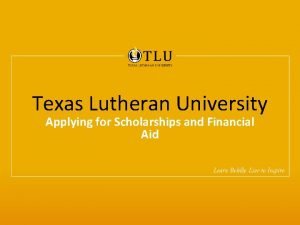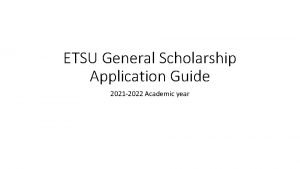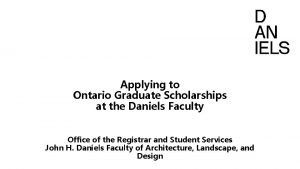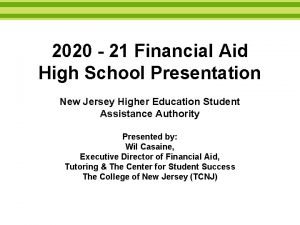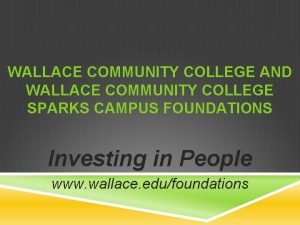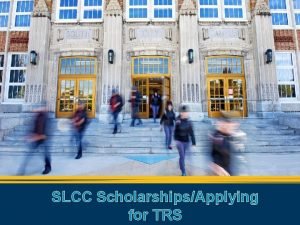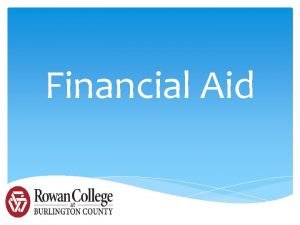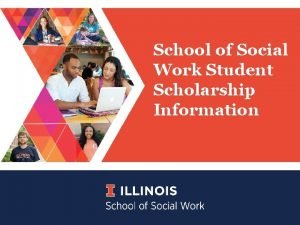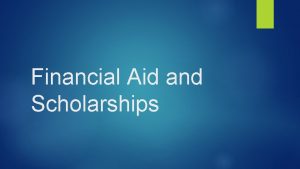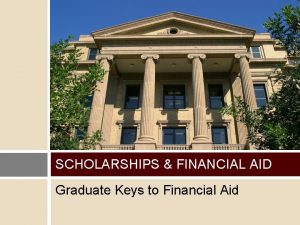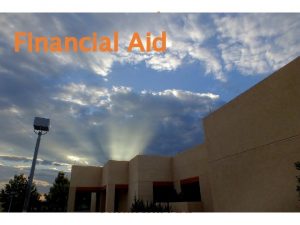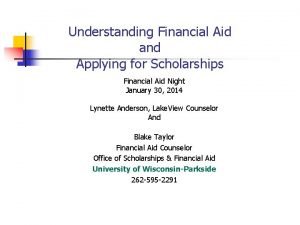Financial Aid and Scholarships What is Financial Aid















- Slides: 15

Financial Aid and Scholarships

What is Financial Aid? Money given, paid or loaned to help pay for college Gift Aid © Grants and Scholarships (free money) Self-Help Aid © Work-Study (job opportunity to earn money) © Loans (money borrowed that must be repaid)

Financial Aid Myths ©Students with the highest grades get all the aid ©Income is too high, so don’t even apply ©Attend the college which offers most aid ©There is no aid for international students

Who Offers Scholarships and Financial Aid ? © USA – Offers the most. Mainly in private universities if you are not a US Citizen -- merit, need-based, IB, athletic, service, etc. © UK – Some merit scholarships, especially in Science and Math fields © Canada – Some merit scholarships – also Scholarships for IB, internationalism, leadership and service.

US Aid for International Students ©Usually only private colleges offer aid. It is usually in two forms: merit scholarships and need-based financial aid. Some colleges have need-blind admissions policies, while others are need-aware or need-sensitive. ©State colleges may have merit scholarships for international students but do not offer need-based aid

Merit scholarships Criteria © High School Grades © High SAT scores © Essays © Teacher recommendations Need-based aid Criteria The college considers the student’s application first – if the application is accepted they then undertake to consider the family’s financial situation and calculate their need. The aid is given as: © Academic Scholarships This is gift aid and is usually renewable for © Work study four years if the student © Need-based grants and maintains good grades loans

Philosophy of Financial Aid ©Parents have the primary responsibility to pay for their dependent children’s education and should plan ahead for these costs. ©Students also have a responsibility to pay for some of their educational expenses. ©Evaluation of family ability to contribute should be fair.

How to Apply for Aid 1. Find out application requirements and deadlines 2. Fill out forms completely, accurately, and legibly 3. Print out copies of all completed forms 4. Comply with all information requests 5. Meet deadlines (obtain proof of mailing!)

How need is calculated Cost of Attendance (COA) - Expected Family Contribution (EFC) = Student’s Financial Need (eligibility)

Cost of Attendance (varies from school to school) © Tuition and fees © Room and board © Books and supplies © Transportation © Miscellaneous personal expenses © Loan fees, study abroad costs, dependent or elder care expenses, expenses associated with a disability, or expenses for cooperative education program

Determining the Expected Family Contribution (EFC) © Income © Asset equity (excluding home equity) © Family size © Number of family members in college (excludes parent enrolled in college) © Age of parents

When you research scholarships: “Billions of Dollars Unclaimed. . . ” Warning signs of possible scams: • Guaranteed winnings • ‘Free seminars’ on financial aid • 1 -900 telephone numbers CAUTION: As a general rule, if you must pay money to get money, it might be a scam.

Something to think about . . . “Education is one of the best financial investments you can make. A bachelor’s degree yields an increase in lifetime earning potential of nearly half a million dollars according to census bureau data. This is equivalent to a 20% annual return on investment. ” (www. finaid. org)

The Demonstrated Interest Factor © Visiting colleges © Communicating with colleges © Signing on to college websites & answering their e-mail messages © Attending college visits to UNIS © Promoting strengths and interests

Helpful Websites ©FAFSA (US Citizens and Permanent Residence): https: //fafsa. ed. gov/ ©CSS Profile: (US and Internationals): http: //student. collegeboard. org/cssfinancial-aid-profile ©Fastweb: http: //www. fastweb. com/
 Texas lutheran university scholarships
Texas lutheran university scholarships University of texas at tyler scholarships
University of texas at tyler scholarships Portland state university scholarship
Portland state university scholarship Etsu scholarship application
Etsu scholarship application Diya pakistan scholarship
Diya pakistan scholarship Ogs mishawaka
Ogs mishawaka New jersey grants & scholarships 2020-21
New jersey grants & scholarships 2020-21 Ekudirect
Ekudirect Wallace community college scholarships
Wallace community college scholarships Slcc scholarships
Slcc scholarships Purdue university rotc
Purdue university rotc Rcbc financial aid
Rcbc financial aid Elk grove regional scholarship
Elk grove regional scholarship Msw scholarships 2019
Msw scholarships 2019 Emerson college scholarships
Emerson college scholarships Utrgv presidential scholarship
Utrgv presidential scholarship
